Main Block Region
Thursday, 24 September 2020, 9:30 AM - 11:00 AM
VIRTUAL: Servitisation in the built environment: Understanding and responding to a new opportunity
The idea of increasing the worth of a product by overlaying additional services – ‘servitisation’ for shorthand – is something that the construction industry is beginning to offer. Servitisation is becoming mainstream in other industries, too. Rolls-Royce, for instance, offers power-by-the-hour on gas turbines, and earns over 50 per cent of its revenues from services. Generally, society’s appetite for services is now outstripping its appetite for product.
There is significant potential for servitisation to develop in the construction industry. Increased use of servitisation can accelerate the industry’s move towards a more circular, service-based and ultimately more sustainable, low-carbon built environment.Join this Business Bytes session to:
- Hear case studies on servitisation in construction (both new build and retrofit projects) and the opportunities being created for building owners, asset managers, prime contractors and supply chains
- Understand how to increase servitisation to achieve circular outcomes by embedding the approach at project inception, design stage and within project budgets
- Recognise and discuss the barriers to servitisation, for example attitudes towards leasing, risk, and budget/financial considerations
- Kaer: Air conditioning as a service
- Aldstone: Award-winning building materials systems enabling tile reuse
- Egg Lighting: Commercial LED Lighting Manufacturer (based in Glasgow)
And also hear from:
- Juan F Azcárate-Aguerre, Architectural Engineer & PhD Researcher in Building Product Innovation, Delft University of Technology - Faculty of Architecture and the Built Environment
Juan’s interdisciplinary research team within the Faculty of Architecture and the Built Environment is developing a circular business model based on the use of multifunctional façades as performance-delivering tools. Under this scheme, the client is no longer the owner of the building envelope and its integrated building services, but instead leases them from a service provider through a long-term performance contract. Rather than purchase the façade panels as a product, the client hires the energy performance and user comfort services delivered to his building by this new façade system.
Any questions, please email mia@supplychainschool.co.uk

GB
Thursday, 24 September 2020, 9:30 AM - 11:00 AM